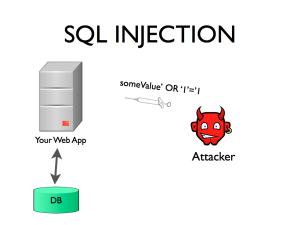SQL Injection is a type of web application security vulnerability in which an attacker is able to submit a database SQL command which is executed by a web application, exposing the back-end database. A SQL Injection attack can occur when a web application utilizes user-supplied data without proper validation or encoding as part of a command or query. The specially crafted user data tricks the application into executing unintended commands or changing data. SQL Injection allows an attacker to create, read, update, alter, or delete data stored in the back-end database. In its most common form, a SQL Injection attack gives access to sensitive information such as social security numbers, credit card number or other financial data.
Take a simple login page where a legitimate user would enter his username and password combination to enter a secure area to view his personal details or upload his comments in a forum. When the legitimate user submits his details, an SQL query is generated from these details and submitted to the database for verification. If valid, the user is allowed access. In other words, the web application that controls the login page will communicate with the database through a series of planned commands so as to verify the username and password combination.
Through SQL Injection, the hacker may input specifically crafted SQL commands with the intent of bypassing the login form barrier and seeing what lies behind it. This is only possible if the inputs are not properly sanitised and sent directly with the SQL query to the database. SQL Injection vulnerabilities provide the means for a hacker to communicate directly to the database. SQL commands include SELECT, INSERT, DELETE and DROP TABLE. DROP TABLE is as ominous as it sounds and in fact will eliminate the table with a particular name.
Preventing SQL Injection
* Use dynamic SQL only if absolutely necessary.
* Escape user input.
* Assume magic quotes is always off.
* Install patches regularly and timely.
* Remove all functionality you don’t use.
* Use automated test tools for SQL injections.
I used following command to check SQL Injection on Linux server
root@serverxx [~]# grep -i union /usr/local/apache/domlogs/* | grep -i select


